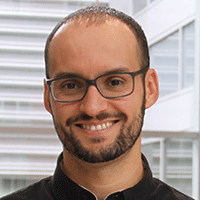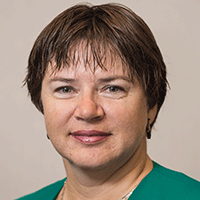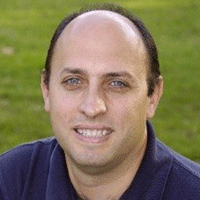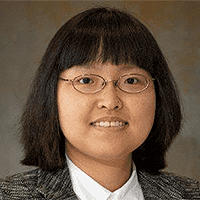An Overview of the NSF DCSD Program
Session Organizers:
Marcello Canova, National Science Foundation, mcanova@nsf.gov
Alexander Leonessa, National Science Foundation, aleoness@nsf.gov
Alena Talkachova, National Science Foundation, atalkach@nsf.gov
Yue Wang, National Science Foundation, yuewang@nsf.gov
Abstract: The National Science Foundation (NSF) offers multiple funding opportunities for scientists and engineers, both within disciplinary programs in Engineering and other directorates, and through foundation-wide cross-cutting initiatives. Within the Civil, Mechanical and Manufacturing Innovation (CMMI) Division, the Dynamics, Control and Systems Diagnostics (DCSD) program supports fundamental theoretical, computational, and experimental research that is knowledge-driven or inspired by applications, focusing on the modeling, analysis, diagnostics and control of the dynamic behavior of systems. This Special Session will offer an overview of the DCSD program, highlighting funding opportunities for the research communities engaged in nonlinear dynamics, structural dynamics, vibrations, acoustics, fluid-structure interactions, and metamaterials. Participants will also learn about specific initiatives aimed at supporting junior investigators, along with essential guidelines for preparing proposals. Key aspects of NSF's criteria for Intellectual Merit and Broader Impacts will be discussed to aid in writing competitive proposals. The session will include a Q&A segment.
Talk Information: Program Directors from the National Science Foundation (NSF) will lead this session, beginning with an overview of the DCSD program and exploring challenges and opportunities relevant to the VIB community, within the current funding landscape. The session will then include suggestions for writing successful proposals. Participation is highly encouraged - attendees will be able to engage directly with the Program Directors, clarify any uncertainties, and discuss potential ideas or concerns.
Estimated Duration: 90 minutes

Marcello Canova, Ph.D.
Program Director - Dynamics, Control and Systems Diagnostics (DCSD)
Boosting Research Ideas for Transformative and Equitable Advances in Engineering (BRITE)
Division of Civil, Mechanical and Manufacturing Innovation (CMMI)
National Science Foundation
Dr. Marcello Canova is a Program Director for the Dynamics, Control and Systems Diagnostics (DCSD), at the National Science Foundation. He is Professor in the Department of Mechanical and Aerospace Engineering at The Ohio State University and a core faculty member at the Center for Automotive Research. Dr. Canova conducts research in dynamic systems modeling, control optimization, and optimal control. His interests lie in advanced propulsion systems, vehicle electrification, energy storage systems, energy management and transportation systems. Dr. Canova has collaborated extensively with leading automotive manufacturers, government agencies, and research consortia, creating energy efficient solutions for internal combustion engines, hybrid electric vehicles, lithium-ion batteries and connected/automated vehicles. Dr. Canova’s contributions have been recognized through numerous peer-reviewed publications, patents, and invited talks at international conferences.

Alena Talkachova, Ph.D.
Program Director, Dynamics, Control and Systems Diagnostics (DCSD)
Division of Civil, Mechanical and Manufacturing Innovation (CMMI)
National Science Foundation
Dr. Alena Talkachova is a Program Director for the Dynamics, Control and Systems Diagnostics (DCSD), at the National Science Foundation. She is a Professor in the Biomedical Engineering Department and a member of a graduate faculty in the Electrical and Computer Engineering Department at the University of Minnesota. Dr. Talkachova has extensive expertise in cardiac electrophysiology, cardiac imaging, numerical simulations, and signal processing. She investigates the electrical activity of the heart from a nonlinear dynamics perspective, aiming to reveal mechanisms of complex cardiac rhythms leading to arrhythmias and to develop algorithms to control such arrhythmias. Dr. Talkachova also developed several novel signal frameworks to perform sophisticated analysis of various bio-signals with the aim to reveal their intrinsic complexity, which cannot be captured via standard signal processing approaches. Dr. Talkachova’s contributions have been recognized through numerous peer-reviewed publications, patents, and invited talks at international conferences.

Alex Leonessa, Ph.D.
Program Director - Dynamics, Control and Systems Diagnostics (DCSD)
Foundational Research in Robotics (FRR)
Mind, Machine and Motor Nexus (M3X)
Division of Civil, Mechanical and Manufacturing Innovation (CMMI)
National Science Foundation
Dr. Alexander Leonessa is a leader in control systems, robotics, and human-machine interaction with over 20 years of experience in academia and research administration. He holds a Ph.D. in Aerospace Engineering and a M.S. in Applied Mathematics from Georgia Tech as well as a B.S. in Aeronautical Engineering from the University of Rome "La Sapienza." A former Full Professor at Virginia Tech, Dr. Leonessa has authored 140+ publications, secured $25 million in research funding, and graduated 50+ graduate students. His work, funded by NSF, DoD, and NASA, spans autonomous vehicles, assistive robotics, and intelligent control systems. He has held leadership roles as Associate Department Head, Director of the Proposal Development Institute, and Chair of the Commission on Research, where he modernized curricula, strengthened industry ties, and advanced interdisciplinary collaboration. Currently, as a Program Director at NSF, he shapes national research priorities in control systems, robotics, and human-machine interaction. A dedicated mentor and advocate for faculty and students, he champions collaboration, innovation, and strategic growth in engineering.

Yue Wang, Ph.D.
Program Director - Dynamics, Control and Systems Diagnostics (DCSD)
Foundational Research in Robotics (FRR)
Boosting Research Ideas for Transformative and Equitable Advances in Engineering (BRITE)
Division of Civil, Mechanical and Manufacturing Innovation (CMMI)
National Science Foundation
Dr. Yue Wang is a Program Director for the DCSD, FRR, and BRITE programs at the National Science Foundation (NSF). She is the Warren H. Owen-Duke Energy Professor of Engineering and the Director of the Interdisciplinary and Intelligent Research (I2R) laboratory at the School of Mechanical and Automotive Engineering at Clemson University. Dr. Wang’s research interests are human-robot interaction systems, multi-robot systems, and cyber-physical systems. Her research contributions include trust-based control for human-robot collaboration systems, collaborative robotics for manufacturing, multi-robot symbolic motion planning, and human-aware control and learning of autonomous vehicles. Dr. Wang has received the Air Force Office of Scientific Research Young Investigator Program (AFOSR-YIP) award, the NSF CAREER award, and the Air Force Summer Faculty Fellowships. Dr. Wang is a Fellow of ASME and a Senior Member of IEEE. She has served as an (Associate) Editor for several leading ASME, IEEE, and IFAC journals and conferences in controls and robotics. Dr. Wang’s contributions have been recognized through numerous peer-reviewed publications including best and top-cited papers, and invited talks at international conferences, universities, national laboratories, and industries. Her work has been featured in NSF Science360, ASEE First Bell, State News, SC EPSCoR/IDeA Research Focus, and Clemson University News.